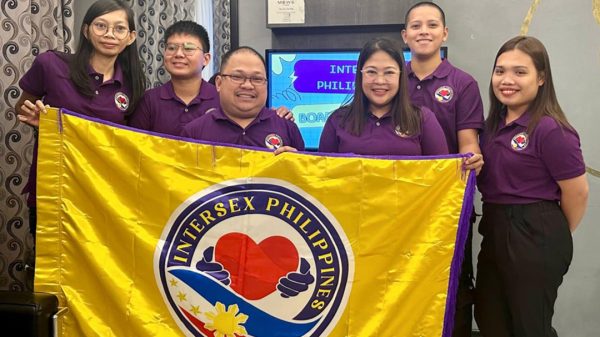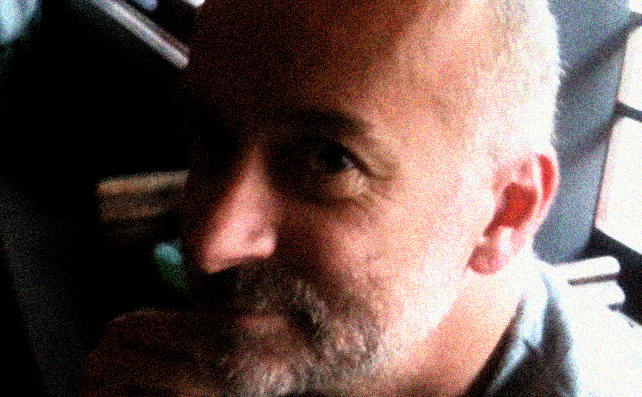Shaun Kirven first came to the Philippines in 2012 and served as the expert on International Humanitarian Law of the International Monitoring Team (IMT) based in Cotabato City in the Autonomous Region of Muslim Mindanao, which monitors the implementation of the peace agreement between the Philippine government and the Moro Islamic Liberation Front (MILF).

“I don’t think of myself as an LGBTI advocate. I find those acronyms now to be too limiting; I prefer to think that for the most part my work is focused on two fundamental rights, the right to equality and the right not to be discriminated against,” Shaun Kirven says.
Before coming to Mindanao, he did human rights work in Guatemala, Nicaragua, Colombia, Argentina, Belgium, the UK, Spain, South Africa, Namibia, Kenya, Iraq, Jordan, Lebanon, Nepal, India, Sri Lanka, Bangladesh, Afghanistan, Pakistan, Thailand, Indonesia, and the US.
Shaun’s international human rights activism, particularly on LGBTI issues, is deeply anchored on two fundamental rights.
“I don’t think of myself as an LGBTI advocate. I find those acronyms now to be too limiting; I prefer to think that for the most part my work is focused on two fundamental rights, the right to equality and the right not to be discriminated against,” Shaun said.
Shaun remembers starting fighting for equality and non-discrimination when he was in university in the UK.
“I could pinpoint one meeting with a local group of the Socialist Workers Party in my university town where I challenged a homophobic statement. The group fell silent. I felt almost guilty. A friend squeezed my hand. I didn’t look back,” Shaun said.
ACTIVISM AS A PROCESS
He recalls his journey on human rights activism as a formative process that came in stages from his childhood to his teenage years.
“I don’t think we start out concerned for the rights of others rather at looking at ways we can feel better within ourselves. At least most of us… (internalize) a lot of other people’s misconceptions and hatred of our sexual and gender identities. Advocacy, I think, comes a later stage. If I were to begin with becoming an advocate, I would be ignoring some of the most formative processes in my early and teenage years that led me to the point of activism,’’ Shaun said.
Shaun’s formative years were spent in a small fishing town in the UK, where men were “real” men and teenage boys were expected to become so.
“I was bullied in and out of school because I was effeminate. It was the 80s, the post punk era of the new romantics was in fashion, men on TV wore make up and dyed their hair. Emulation was not wise in that small town. Parts of this very quintessential English town became out of bounds because of the way I expressed my teenage self,” Shaun said.
ON SELF-EXPRESSION
Shaun dissociates himself from the term “gay.”
“I don’t think this adequately represents either my sexuality or the way I express myself. Don’t get me wrong, I have no issue now with femininity or the feminine, and by extension gay men’s expression of self that doesn’t fit with masculine stereotypes our society’s construct. If I am honest to myself, I did as a teenager – conscious of the way others thought of me – shy away from open expressions of what I understood as camp,” Shaun said.
Growing up different from most of his peers, Shaun admits that the very real threat of violence curtailed much of his youth, and yet he found ways to resist.
“I resisted in the only way I knew, and that was to harden the outer image. Flamboyant clothes gave way to rags, diamante earrings gave way to piercings, mostly done at home with a needle and wine bottle cork, 80s hairstyles gave way to harder punky Mohicans,” Shaun said.
In his new found self-expression, Shaun started to meet other people who experienced exclusion and who have a different take on justice.
“I was an anarchist. I moved to Madrid to live in a squat and learn Spanish. I ate my lunch in the Casa Communista. I began to read. I went back to school and read social and economic history. I learnt about Marx. I loved Marx. I marched. I protested. I felt almost free. Anarchist and Marxist communities are not very tolerant of difference. My sexuality, though providing for some great sexual adventures, remained largely hidden and desires mostly unacted upon. It took me a long time to reconcile my political beliefs and my sexuality and challenge the obvious discrimination that those proposing change employed,” Shaun said.
HUMAN RIGHTS LENS
Shaun’s drive for fighting for human rights has been a cumulative process that for him was triggered by a point in his life when enough became enough.
“I hated the feeling inside that being bullied left me with. That feeling that I was helpless and totally exposed to the threats of violence and intimidation. Home life wasn’t much different. The only place that felt secure, safe was me. The resilience behind the piercings, crazy haircuts, the rags and the ‘fuck you’ attitude was what kept me going. By this time I also had tattoos and like many of my chosen community, a healthy appetite for drink and drugs. I justified my youthful self-obsession because I had been bullied, ridiculed, hated,” Shaun said.
In Shaun’s university years, he was sent abroad to study. He traveled through Central America and met other lesbian and gay organizations that made him realize that experiences apart from a few cultural exceptions were fundamentally similar.
“I swapped my ideological view of change for a human rights perspective. Anarchism and Marxism had never made good bedfellows, to be honest I think I thought at the time I was saving myself a big headache. I was wrong. Viewing the world and the need to change through a human rights lens has not been an easy job,” Shaun said.
LEARNING FROM FEMINISMS
Shaun believes that the LGBTI movement has a lot to learn from feminisms.
“I use the plural as I don’t see the schools of thought fitting comfortably under the singular. Much like the feminist movement the LGBTI movement has suffered separatism and conflict but we have not learnt to embrace that difference in an enriching way,” Shaun said.
Shaun understands that much like women, the LGBTI movement has put up with much challenges over the years, hence the over-concentration on identities.
“What we don’t seem to realize is that if we looked beyond our noses, stopped staring at our own navels, feminisms and queer theory have given us the tools to deconstruct the power bases of those who deny us our rights to equality and non-discrimination,” Shaun said.
Shaun points out two issues of the movement’s work that need to be looked at with greater rigor.
First is marriage equality.
“Wasn’t marriage created by patriarchy and institutionalized by politico-economic regimes such as capitalism and communism? Isn’t the access to social benefits an argument only for those privileged middle class people living in the West? People who have bought the capitalist model and placed it alongside their 52-inch interactive TV. What would Marx say about the gay channels on Netflix if he were around? Something about opium for the gay masses maybe? We are not the same as anyone else, so why pretend to be? We – above all the LGBTI community – should be pushing the diversity agenda,” Shaun explained.
The second is third gender.
“Queer activists have been trying to rid the world of the binary gender construct that most feminists and a growing number of masculinists would agree have prevented people from reaching their full potential as human beings. Now we have people actively campaigning for legal recognition of a third. Along with the third comes the other status box to be ticked in official documents that proponents say will facilitate travel abroad and prevent violent responses from state security forces. Aware that I speak from a position of cisgendered privilege here, I have discussed this at great length with trans activists both for and against the third category. I am not convinced,” Shaun discussed.
The experiences of migrant worker populations from some developing countries show how LGBTIs are affected.
“If we take the case of Nepal or even the Philippines, which have huge migrant worker populations comprised of, I would imagine, a large number LGBT folks, is being able to mark ‘other’ on your passport actually going to help you gain employment in a foreign country? 4.5 million people are without citizenship in Nepal. The other status on trans folks passports will benefit it is said around 10 people linked to NGOs. Transwomen migrant workers looking to work in the Middle East are going to continue to bind breasts and travel as close to their male gender marker as possible. If I could track down the Filipino transwomen in Afghanistan, I would love to ask her if ‘other’ status on her passport would actually help. Doing away with gender markers altogether surely is a better way to go,” Shaun discussed.
DESIRE TO BE “NORMAL”
Shaun expresses disappointment on how far the LGBTI movement is from being what he understands is a community.
“Despite all the noise about how wonderfully we are doing really, we haven’t moved an inch. Some 20 years later I am reading the Beauty Myth by Naomi Wolf, (and) this book is making me more and more angry at the way companies go to war with women’s bodies and minds. As a confirmed ‘Clinique boy,’ I was somehow rather shocked at my own naivety. As with everything I read, a discussion with a friend ensued who stated that the book is old and outdated by now and they went on to suggest that I read another more modern take on the corporate war against being woman,” Shaun said.
Shaun’s retort is that 20 years on, apart from a few figures, the book is still relevant and that for him is extremely saddening.
“All the gains we have made in the LGBT movement have not stopped this war against our bodies and minds. We have just become willing targets of patriarchy and capitalism due to our desire to be ‘normal’,” Shaun said.
INCLUSIVITY IN PRIDE
Despite all the differences in the LGBTI movement, Shaun is inspired of the ways people can still come together and do some amazing work.
“I recently went to Brighton Pride, by mistake, with my mother in tow. It was her first Pride march. While she delighted in the fun people were having, I could not get away from corporate slogans all over people’s bodies. What I took away from that day was my mother’s almost childish sense of freedom that this march gave her. Her sense that she belonged not because of her identity but because she, like so many others, believes people should be free. Inclusive Pride marches that are truly welcoming of everyone who wants to be there really are the manifestation of our movement’s spirit. If we can do that without the corporate branding, even better,” Shaun said.
For his proudest moment, he walked in eight-inch stiletto heels to prove a point.
FUTURE PLANS
After decades of human rights work, Shaun speaks of a simple legacy.
“I have been working on my ego for some time with limited success but with still enough to know that people don’t get remembered. I would like to think that during my time, I have loved and been loved and shown love in the face of hatred,” Shaun said.
For future plans on his human rights work, Shaun continues his activism in the Philippines and in Asia.
“I am super interested in engaging with a broad bodily rights and bodily autonomy campaign with the Coalition of African Lesbians. That is going to take up most of my spare time. Closer to home, I will be wearing my Proud T-shirt on my first day in the office in Cotabato City when I take up my new job with the Regional Human Rights Commission,” Shaun ended.
Shaun Kirven is currently the United Nations Development Programme expert on human rights at the Regional Human Rights Commission based in Cotabato City in the Autonomous Region of Muslim Mindanao in the Philippines. He continues to serve on the boards of LOOM-Nepal (a feminist organization) and Protection Desk Nepal (a local organization that works on protection of human rights activists).





























































